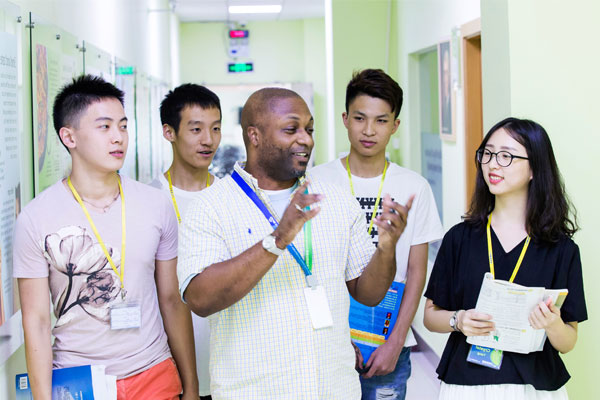出国面签,口语不过关,
面试官的脸说黑就黑!
国际贸易,沟通不顺畅,
天价订单说飞就飞!
人在职场,英语不行,
升职加薪无望!
封闭式管理,纯英语环境,采用『浸泡式』学习法,
按测试水平入学分班,小班教学。
英语是唯一的
校内通行语言,力求每位学员在较短的时间
内真正
内化英语,实现流利英语脱口而出的梦想。
“与世隔绝”,Sorry!
这段时间我只与英语作伴!
衣食住学 English Only,
听说训练满分 Get!
纯英语环境,
厨房大叔和清洁阿姨都能飚英语!
 名中外教,打造国际文化氛围!
名中外教,打造国际文化氛围!
具备丰富教学经验的外教团队,
教师来自十几个国家,均持有外国专家证书及 TESOL 国际教师资格证,
融英语教学于生活, 营造浓郁国际文化氛围,
让您在这小小的联合国中尽情享受异国风情和多元文化交融之体验。

|

|

|

|

|
了解更多国际师资

时间:2016-11-22 14:33:44
来源:www.pinghe.com 作者:平和英语村
Let me start by noticing what is both obvious and curious:We are here today together. We are here in association. It is an association of many people, and many generations. We celebrate a connection across time in these festival rites, singing our alma mater,adorning ourselves in medieval robes to mark the deep-rooted traditions of Harvard,and of universities more generally. Even in the age of the online and the virtual, an institution has brought us together, and brings us back.
我想先说一些显而易见的事情:我们今天在一起,在一个组织里,这个组织代表了许多个人,和许多代人。我们在此庆祝跨越时间的传承,我们穿着中世纪的礼服来歌颂母校,以此彰显哈佛深厚的历史内涵和大学教育的普遍内涵。在网络遍布的现代社会,我们却因这样的历史纽带聚在一起。
Dozens of generations have come and gone since then, and the University’s footprint has expanded considerably beyond a small cluster of wooden buildings. But we have never lost faith in the capacity of each generation to build a better society than the one it was born into. We have never lost faith in the capacity of this College to help make that possible. As an early founder, Thomas Shepard put it, we hope to graduate into the world people whoare, in his words, “enlarged toward the country and the good of it.”
自此以后,一代代人来了又去,哈佛的校园也不断扩大,不再局限于当年的几间小木楼。但没有变的是,每一代人都充满信心,想要建立更好的社会,每一代人也都相信,这所大学将使这种愿望成为可能。正如一位早期创始人ThomasShepard 所说,我们希望毕业生走向世界之后,能够成长为对国家有益之人。
Yet now, nearly four centuries later, we find ourselves in a challenging historical moment. How do we “enlarge” our graduates in a way that benefits others as well? Shepard spoke of enlarging “toward” – toward, as he put it, “the country and the good of it.” Are we succeeding in educating students oriented toward the betterment of others? Or have we all become so caught up in individual and personal achievements, opportunities, and appearances that we risk forgetting our interdependence, our responsibilities to one another and to the institutions meant to promote the common good?
而如今,将近四个世纪后,我们发现我们处在一个充满挑战的历史时刻。我们应如何鼓励我们的毕业生去做对他人有益之事?我们是否培养出了以造福他人为目的的毕业生?还是,我们所有人都已变得对个人成就、机遇和形象如此痴狂,以至于忘记了我们的互相依赖,忘记了我们对于彼此和对于这所旨在促进公共利益的大学的责任?
This is the era of the selfie – and the selfie stick. Nowdon’t get me wrong: There is much to love about selfies, and two years ago in my Baccalaureate address I concluded by urging the graduates to send such pictures along so we could keep up with them and their post-Harvard lives. But think for a moment about the implications of a society that goes through life taking its own picture. That seems to me a quite literal embodiment of “self-regarding” – a term not often used as a compliment.
这是一个自拍——还有自拍杆的时代.不要误解我:自拍真是件令人欲罢不能的事儿,而且在两年前的毕业典礼演讲上,我还特意鼓励毕业生们多给我们发送一些自拍照,让我们知道他们毕业后过得怎么样。但是仔细想想,如果社会里的每个人都开始过上整天自拍的生活,这会是怎样一个社会呢?对于我来说,那也许是“利己主义”最真实的写照了。
In fact, Merriam-Webster’s dictionary offers “egocentric,”“narcissistic,” and “selfish” as synonyms. We direct endless attention to ourselves, our image, our “Likes,” just as we are encouraged – and in fact encourage our students – to burnish resumes and fill first college and then job or graduate school applications with endless lists of achievements – with examples, to borrow Shepard’s language, of constant enlargements of self.
韦氏词典里,“利己主义”的同义词包括了“以自我为中心”、“自恋”和“自私”。我们无休止地关注我们自己、我们的形象、我们得到的“赞”,就像我们不停地用一串串的成就来美化我们的简历,去申请大学、申请研究生院、申请工作——借用Shepard的话来说,就是进行不停的“自我放大”。
As one social commentator has observed,we are ceaselessly at work building our own brands. We spend time looking at screens instead of one another. Large portions of our lives are hardly experienced: They are curated, shared, Snapchatted and Instagrammed – rendered as a kind of compositeselfie.
正如一位社会评论家所观察到的那样,我们都在不停地为打造自己的品牌而努力。我们花很多时间盯着屏幕看,却忽视了身边的人。我们生活中的很大一部分经历不是被我们体验到的,而是被保存、分享并流传于Snapchat和Instagram等APP上的——最终它们呈现出的是一种由我们所有人合成的自拍照。
Now, a certain amount of self-absorption is in our nature.As Harvard’s own E.O. Wilson has recently written, and I quote him, “We are an insatiably curious species – provided the subjects are our personal selves and people we would know or would like to know.” But I want to underscore two troubling aspects of this obsession with ourselves.
当然,适度的利己是我们的本性。正如我们哈佛大学的生物学家E.O. Wilson(爱德华·O·威尔逊)教授最近写道的:“我们是一个充满无尽好奇心的物种——只要对象是我们自己以及我们自己知道或想知道的人们。”但是我想强调的是,这种自我迷恋会有两个令人不安的后果。
The first is it undermines our sense of responsibility to others –the ethos of service at the heart of Thomas Shepard’s phrase describing Harvard’s enduring commitment to graduate students who are “enlarged” to be about more than themselves. Not just enlarged for their own sake and betterment– but enlarged toward others and toward the world. This is part of the essence of what this university has always strived to be.
首先,它削弱了我们对于他人的责任感——一种服务他人的意识。这种意识正是Thomas Shepard(托马斯·希帕德)所描述的哈佛大学的使命:让毕业生们不断成长,超越自我。这种成长并非仅仅是为了每个人自身的利益,更是为了他人和整个世界——这也是这所大学一直以来努力为之奋斗的使命。
There is yet another danger we should note as well. Self-absorption may obscure not only our responsibilities to others but our dependence upon them. And this is troubling for Harvard, for higher education and for fundamental social institutions whose purposes and necessity we forget at our peril.
利己主义除了削弱了我们的服务意识,还有一种后果也是我们应当注意的。过度的自我关注掩盖的不仅是我们对于他人的责任,还有我们对于他人的依赖。对于哈佛大学、对于高等教育、对于各种社会基础机构,这很是令人困扰。我们遗忘了高校和机构存在的目的和必要性,使我们自己处在危险的境地。
Why do we even need college, critics demand? Can’t we do it all on our own? Peter Thiel, Silicon Valley entrepreneur, has urged students to drop out and has even subsidized them – including several of our undergraduates– to leave college and pursue their individual entrepreneurial dreams. Afterall, the logic goes, Mark Zuckerberg and Bill Gates dropped out and they seem to have done OK. Well, yes.
为什么我们还需要大学?批评家们问道:我们就不能全靠自学吗?硅谷创业家Peter Thiel(彼得·蒂尔)敦促学生们辍学,甚至还给予他们经济补助,让他们辍学创业——这其中也包括我们哈佛的一些本科生。毕竟,从逻辑上来讲,马克·扎克伯格和比尔·盖茨都辍学了,他们似乎都很成功。事实如此,没错。
But we should remember: Bill Gates and Mark Zuckerberg had Harvard to drop out of. Harvard to serve as the place where their world-changing discoveries were born. Harvard and institutions like it to train the physicists, mathematicians, computer scientists, business analysts, lawyers, and thousands of other skilled individuals upon whom Facebook and Microsoft depend.
但是请大家别忘了:比尔·盖茨和马克·扎克伯格都是从哈佛辍学的!哈佛是孕育他们改变世界想法的地方。哈佛以及其他像哈佛一样的学府培养了数以千计的物理学家、数学家、计算机科学家、商业分析师、律师和其他有一技之长的人,这些都是Facebook和微软公司赖以生存的员工。
Harvard to enlighten public servants to lead a country in which Facebook, Microsoft, and companies like them can thrive. Harvard to nurture the writers and filmmakers and journalists who create the storied “content” that gives the Internet its substance.
哈佛也培养了无数的政府官员和人民公仆,建设和领导国家,让像Facebook、微软以及类似的公司可以繁荣发展。哈佛大学还培养了无数的作家、电影制作人和新闻工作者,是他们的作品给互联网增添了“内容”。
And wemust recognize as well that universities have served as sources of discoveries essential to the work of the companies advancing the revolutions in technology that have changed our lives – from early successesin creating and programming computers to development of prototypes that laid theground work for the now-ubiquitous touchscreen.
而且我们也要看到,大学是人类和社会技术革新的源泉,这些革新是互联网公司发展的基石——从早期创造计算机和编写计算机程序的成功,到如今无处不在的触屏奠定基础的的发展。
Institutions embody our present and enduring connections to one other. They bring our disparate talents and capacities to the pursuit of commonpurpose. At the same time, they link us to both what has come before and what will follow. They are repositories of values – values that precede, transcend, and outlast the self. They challenge us to look beyond the immediate, the instantly gratifying, to think about the bigger picture, the longer run, the larger whole. They remind us that the world is only temporarily ours, that we are stewards entrusted with the past and responsible to the future. We are larger than ourselves and our selfies.
机构体现了我们与其他个体之间持久的联系,它们将我们不同的天赋和能力拧成一股绳,去追求共同的目标。同时,它们也将我们与过去和未来维系起来。它们是价值的金矿——这些恒久的价值超越了每一个自我。机构促使我们放弃眼前即刻的快感,思考更远大的图景,更长远的全局。它们提醒我们世界只是暂时属于我们,我们肩负着过去和未来的责任,真正的我们要比我们自己和我们的自拍照要广博得多。
That responsibility is quintessentially the work of universities – calling upon our shared human heritage to invent a new future – the future that will be created by the thousands of graduates who leave here today. Our work is about that on going commitment – not to a single individual or even one generation or one era – but to a larger world and to the service of the age that is waiting before it.
而大学的责任正在于此——用我们共同的人类遗产号召大家去开拓未来——这个未来将由今天从这里毕业的数千名哈佛学生去创造。我们的工作是一个持续的承诺,它并不针对单一的个体,甚至不针对一代人或一个时代,它是对一个更大的世界的承诺,是一个对于正在等待它服务的时代的承诺。
In 1884, my predecessor Charles William Eliot unveiled a statue of John Harvard and spoke of the good that can come from the study of what we might call the “enlarged” life of the man whose name this university bears.
1884年,我的前辈、Charles William Eliot(查尔斯·威廉·艾略特)校长为约翰·哈佛雕像揭幕,并谈到研究约翰·哈佛——这位冠名了这所大学的人——“波澜壮阔”的一生带来的启发。
Eliot said: “He will teach that the good which men do lives after them, fructified and multiplied beyond all power of measurement o rcomputation. He will teach that from the seed which he planted … have sprung joy, strength, and energy ever fresh, blooming year after year in this garden of learning, and flourishing … as time goes on, in all fields of human activity.”
Eliot校长说:“他(约翰·哈佛)会告诉人们善行会流芳百世,会以超越所有计量方式的速度和规模繁衍。他会教导人们,在这个教育花园里播下的种子,如何迸发出喜悦、力量以及永远新鲜的能量,年年花开,随着时光流转,在人类活动的所有领域,花繁叶茂。”
In other words, that statue we paraded past this afternoon is not simply a monument to an individual, but to a community and an institution constantly renewing itself. Your presence here today represents an act of connection and of affirmation of that communityand of this institution. It is a recognition of Harvard’s capacity to propel you toward lives and worlds beyond your own. I thank you for the commitment that brought you here today and for all it means and sustains. I wish you joy, strength, and energy ever fresh.
所以,今天下午我们列队行进经过的那座雕像,它不仅仅是一座代表个人的纪念碑,更是代表一个不断自我更新的社区和机构的纪念碑。你们今天坐在这里,就代表了一种对于哈佛这个社区和机构的认可,这种认可也是你对于哈佛驱使你超越自我、惠及他人的感召力的认可。我感谢你们今天在这里的许下的承诺,祝你们每一位都开心、健康且永远充满活力!

